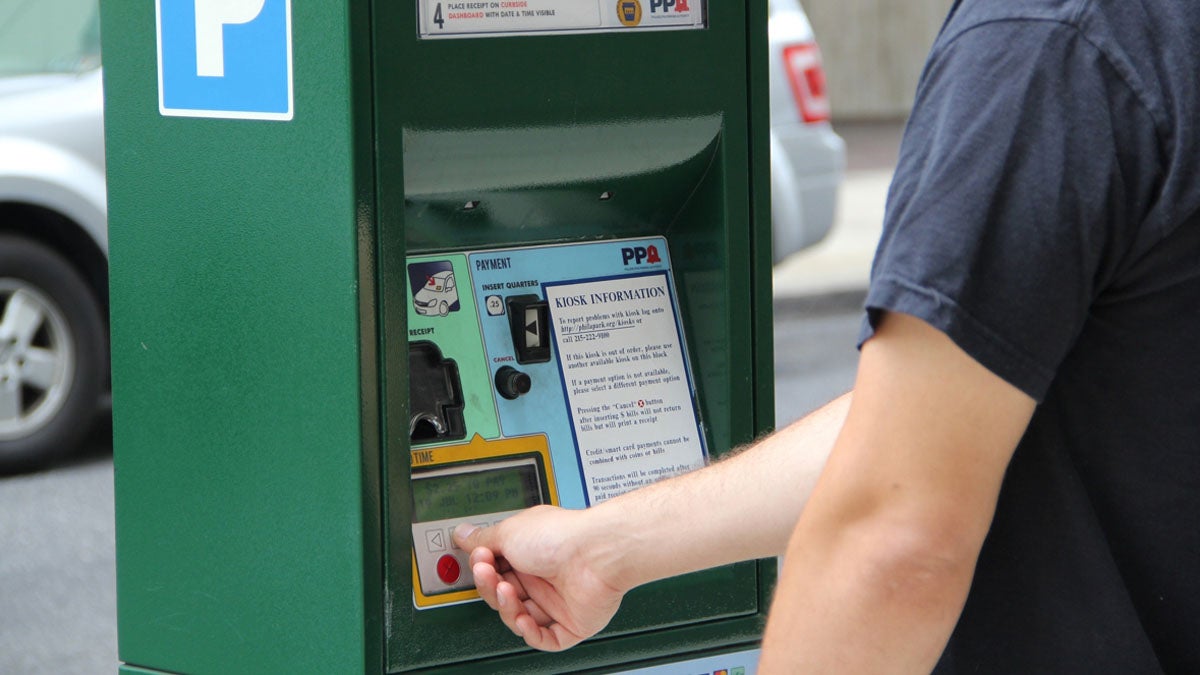As Philly pulls the plug on parking app, other Pa. cities persevere

A driver uses one of the Philadelphia Parking Authority kiosks. The PPA suspended its smartphone app, MeterUp, on Wednesday, April 12, 2017. (Emma Lee/WHYY, file)
Pango remains in use in Scranton, Wilkes-Barre, Hazleton and other Pennsylvania cities.
As someone who drives around Pennsylvania a lot, I have all the parking apps installed on my phone: ParkMobile, Pango, MeterUp. I have a credit card on hand for cities that use card-reader meters. The one thing I don’t have — and won’t ever have when I need it most — is change.
But drivers in Philadelphia over the next few months may want to shake out those couch cushions. The city has suspended its parking app system, MeterUp, and is looking for a new vendor to fill that vacancy. Other forms of cashless payment, credit card kiosks, for example continue to be available.
The Philadelphia Parking Authority said in a statement on Tuesday that Pango, the parent company of MeterUp, was experiencing revenue shortfalls and couldn’t pay contractors, including those who processed credit card payments.
Pango is used in more than 60 cities around the globe. The idea behind these parking apps is simple: enter your credit card once, on your phone, and pay to park in certain zones around the city. Either the city pays the company for the cost of the service or it is passed onto the user in the form of a convenience fee.
The convenience fee was the sticking point in Philadelphia. Pango proposed charging just one cent per parking transaction in Philadelphia, much lower than the convenience fee offered by other apps. The city awarded Pango the contract on the strength of that proposal.
Pango said in a statement that the company “has tried to work with PPA to find solutions … that would give Pango the opportunity to make additional income beyond the $.01 convenience fee, to help limit losses. After months of meetings without progress on those solutions, and since PPA demanded to cut off value-added services that were already in place, both parties have now agreed that this agreement cannot continue.”
Pango had plans for advertising, local business validation and coupon programs and other revenue-generating streams. Those never went into effect, leaving the app to collect only one cent per transaction.
Pango did not return requests for comment for this story.
MeterDown, but Pango lives on
While MeterUp is done in Philadelphia, Pango continues to work in other Pennsylvania cities. The app can be used in Scranton, Pittston, Wilkes-Barre, Hazleton, Latrobe, and Butler.
Michael Gray, director of public works and sanitation in Latrobe, says the Pango app has been a little slow over the last few days, but is still up and running.
“Our biggest issue with the app is just getting people to use it,” said Gray. “We have an older population and they still use the coin meters. But we haven’t had any issues for those who do want to use it.”
The Hazleton Standard-Speaker reports that the city plans to continue using Pango and hasn’t had any issues with the app. Hazleton city officials were even participating in a training put on by Pango on Thursday.
Wilkes-Barre charges a 14 cent convenience fee, but the other five cities charge no fee to the user and pay Pango directly for the use of the app.
Pango to Parkmobile
This parking app shake-up will feel very familiar to Harrisburg residents. The city switched from Pango to a similar app, Parkmobile, in February.
The biggest change was in the convenience fee: Parkmobile charges 35 cents per transaction, while Pango only charged 14 cents. But Pango was error-prone and often resulted in drivers getting improper tickets. According to PennLive, Harrisburg parking officials had to void 117 tickets last March due to Pango failures.
Pango was initially chosen over Parkmobile due to the low convenience fee and the promise of cost-reducing partnerships with local businesses. Those never materialized and the high failure rate led the city to switch to Parkmobile.
Nationally, ParkMobile is the most widely-used parking app both in terms of users and footprint. It is the app of choice in a number of Pennsylvania cities, including Pittsburgh, State College, and Lancaster. And if Philadelphia decides to go with Parkmobile, many residents won’t skip a beat — Temple University already uses the app for its parking garages.
WHYY is your source for fact-based, in-depth journalism and information. As a nonprofit organization, we rely on financial support from readers like you. Please give today.


